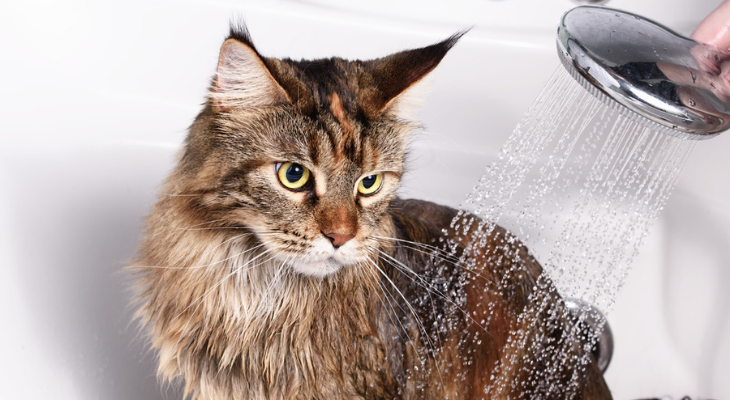
When Should You Bathe Your Cat?
Bathing may be one of your favorite ways to relax, but chances are that your cat has a very different opinion. In fact, even a few drops of water may send your feline friend scurrying for safety under your bed. Despite your pet's feelings about getting wet, should you ever bathe your cat?
How Often Do Cats Need Baths?
Most cats never need baths, thanks to their efficient self-grooming system. Tiny hooked structures on the surface of your pet's tongue remove dirt and debris and distribute skin oils that keep your cat's coat sleek and glossy. In the wild, cats use these hooks, known as papillae, to remove muscle from the bone when they catch their prey.
There's no such thing as too much grooming as far as your pet is concerned. A cat may devote as much as 50 percent of its day to licking its fur, according to Catster. Feline tongues are so effective at grooming that they inspired researchers to create a new type of cleaning brush. The tongue-inspired grooming brush (TIGR) contains tiny spines that easily remove hair and debris from people and pets.
Although the majority of cats can skip baths, bathing may be needed in these situations:
- Grooming Alone Won't Get Your Cat Clean. Your cat may need a bath if it's rolled around in something sticky or smelly or brushed against your freshly painted wall. If the substance on your pet's fur is toxic if swallowed, a bath is always a good choice.
- Your Pet Has Long Hair. Grooming is a much more time-consuming process for long-haired cats. If your long-haired cat isn't a diligent groomer, its hair could soon become matted and dirty. Periodic baths can improve your pet's condition and appearance, although your cat may not always need a full bath. If you notice bits of feces stuck to your pet's hair, a quick wash of your cat's back end may be helpful. Trimming the hair in that area will prevent problems in the future.
- Your Cat Doesn't Have Any Fur. Hairless cats require special care to prevent skin issues. Skin oils are absorbed by the hair in both long- and short-haired cats but they build up on your hairless cat's skin. Bathing removes the oils and keeps your cat's skin in good condition. Your hairless cat may need to be bathed one or two times a week depending on how quickly oil builds up. In between bathing sessions, gently rub your cat's body with a soft cloth that absorbs skin oil.
- Grooming Is Difficult. A bath may be necessary if your cat struggles with grooming. Cats that are elderly, obese, or have arthritis may not be flexible enough to clean themselves thoroughly. Having dementia also affects a cat's ability to groom itself because it may forget to do so regularly.
- Your Cat Has Fleas or Other Pests. Baths can help get rid of fleas, mites, and other bugs. Before you use flea shampoo or dip, ask your veterinarian if it's the best option for your pet. Some flea products may not be safe for kittens, older cats, or cats with health issues. A topical flea treatment might be a better option than a bath in some cases.
- Someone in Your Home is Allergic to Cats. Bathing your cat removes saliva and dander (dead skin cells), two substances that can trigger allergic reactions. Although the effects of baths are short-lived, bathing your cat will reduce your exposure to dander and saliva. Don't bathe your cat more than once a week, as more frequent baths can dry your pet's skin. In between baths, wipe your cat's fur with baby wipes to remove allergens.
Are you concerned about your cat's coat or fleas? Contact our office to schedule an appointment.
Sources:
All About Cats: Amazing Facts About Your Cat's Tongue, 12/1/21
Readers Digest: Do Cats Need Baths?, 12/1/21
Catster:8 Facts About How and Why Cats Groom Themselves, 5/24/16
National Geographic: How Cat Tongues Work – and Can Inspire Human Tech, 11/19/18

